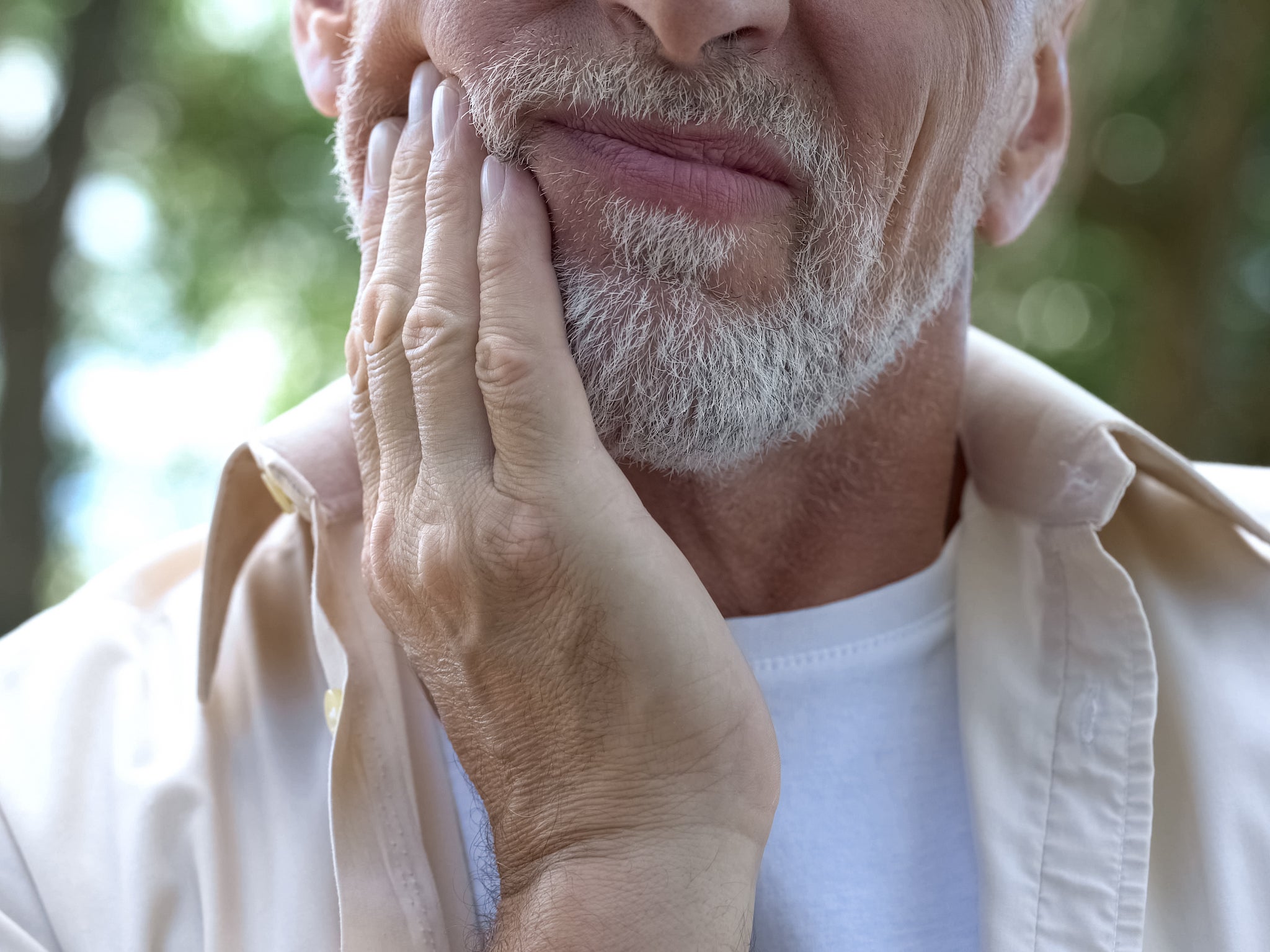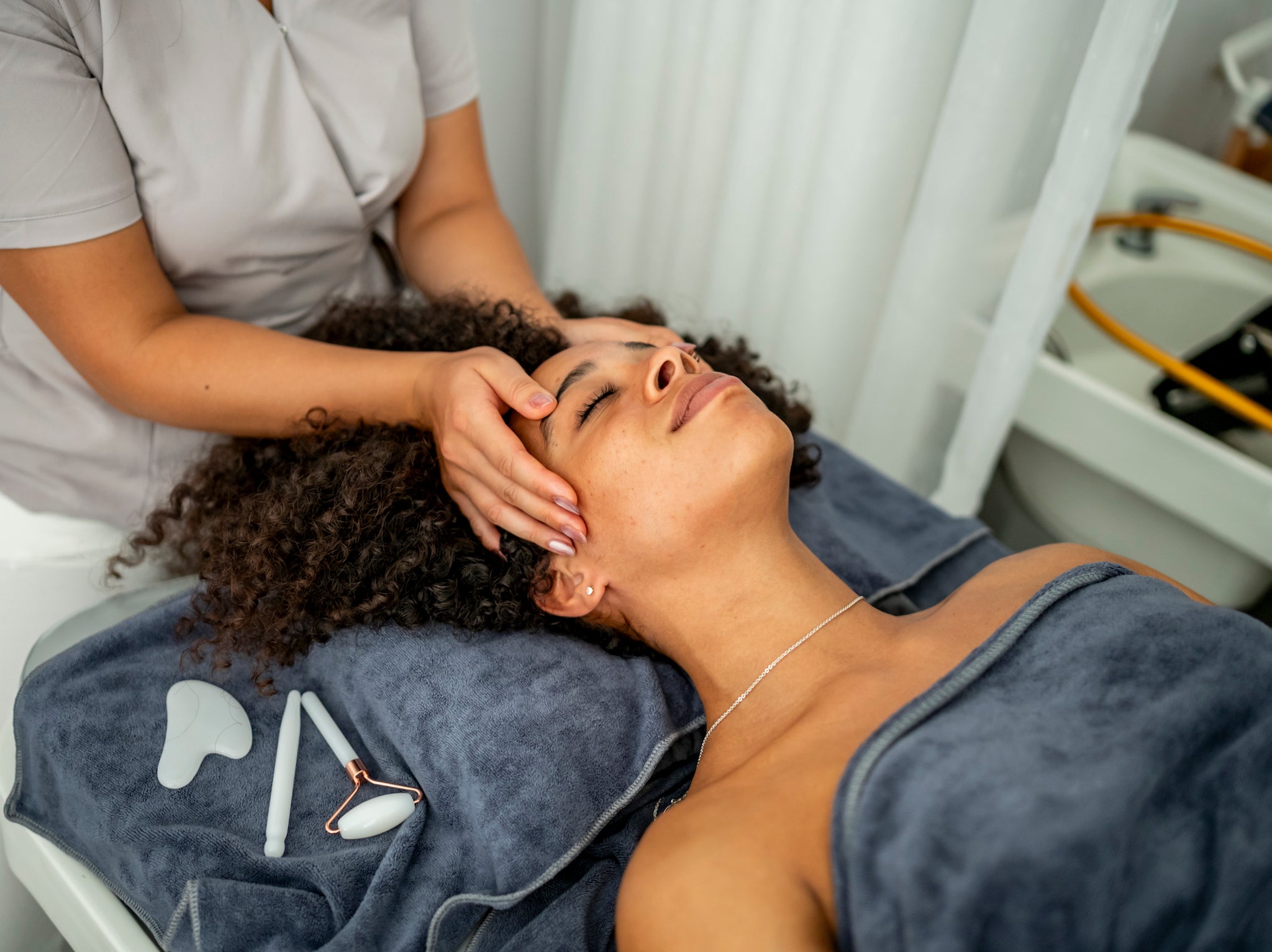
If you’ve ever experienced a stress headache, it’s possible you might be suffering with TMJ – a painful condition that the likes of Zoe Ball, Iggy Azalea and Dermot O’Leary have publicly discussed their struggles with.
TMJ, which stands for temporomandibular joint, encompasses a range of symptoms, from recurrent headaches to acute pain in the joint and jaw muscles. It can be caused by high stress levels and symptoms of stress, like teeth grinding and clenching, but also by jaw injuries and issues with teeth alignment.
Stress can manifest in the body in a variety of strange ways. It’s not just a mental experience – from headaches to hives, gut issues to autoimmune diseases, high or chronic stress levels can impact us on a cellular level resulting in a number of physical symptoms, including TMJ.
A paper published in Frontiers in Neurology in 2023 reported that 22 per cent of people grind their teeth. “It can affect individuals across all age groups and often remains undiagnosed until secondary symptoms such as temporomandibular joint (TMJ) discomfort, myofascial pain, or significant dental wear become apparent,” explains dentist and aesthetician Dr Tara Francis.
But TMJ isn’t just teeth grinding. Many people experience intolerable headaches, chronic tension, sleep issues and symptoms like a clicking or popping sensation in their jaw.
What causes TMJ?
Experts suggest several causes for TMJ, the first of which is high stress. But there are many other factors that can influence jaw tension.
“It’s commonly associated with psychological factors such as stress, anxiety and sleep disturbances,” says Dr Francis.
“But it may also be influenced by discrepancies in bite, certain medications (particularly SSRIs), lifestyle factors such as excessive caffeine or alcohol consumption and even genetic predisposition. In many cases, individuals are unaware of their parafunctional habits until symptoms arise.”
Hormonal fluctuations can also cause jaw tension and a widely undiscussed symptom of menopause can be bone loss in the jaw, along with other areas of the body. As we age and our hormone levels drop, muscle and bone density is affected and joins can become inflamed and painful.
Read more: I tried mouth taping for three weeks, and the results surprised me
Inflammation can also be caused by pain conditions like fibromyalgia, which causes several areas of the body to become sore and tender, particularly joints.
Misalignments can also cause TMJ. The growth of your wisdom teeth and any orthodontic corrections can cause movement in the jaw and this can put pressure on the temporomandibular joint and dislodge a small area called the articular disc.
You might develop TMJ after dental work like Invisalign or fixed braces, or after having teeth removed – both can affect your jaw and your bite. Pressure can also be created when your jaw is damaged through injury or if you happen to have an over or underbite that prevents your jaw from hinging or opening properly.
In short, there are several causes for jaw discomfort and the symptoms can range from mild to entirely debilitating, affecting your speech, sleep and ability to chew.

How to manage TMJ symptoms
Mouth exercises
Posture exercises and mewing aren’t just a hot topic on Tiktok; mouth exercises have also been shown in some instances to ease the symptoms of TMJ. You might have seen myofascial experts sharing videos on the various exercises you can do to ease jaw pain. These include rolling and moving your tongue, opening and closing your mouth in various patterns and rolling your neck.
Some studies have shown that repeated stretching and movement of muscles can help with easing pain and tension. However, in some cases, muscles can be overactive, and this is often one of the causes of TMJ so it’s worth exercising caution and consulting with a physiotherapist to discern whether certain exercises could benefit you.
Botox
Botox is also commonly used to treat jaw tension because it can weaken and suspend the masseter muscles, reducing the intensity of tensing and grinding. “Botulinum toxin acts by temporarily inhibiting the chemical messenger called acetylcholine from being released at the junction where the nerves and muscle meet, thereby reducing the hyperactivity of the masseter muscles,” explains Dr Francis.
“In my clinical practice, I manage over 100 patients annually for TMJ-related symptoms using Botulinum toxin therapy. It has become an increasingly in-demand treatment for patients who have not responded to dental appliances or who are seeking non-invasive, functional relief without the need for ongoing mechanical appliances,” she says.
The effects of Botox injections typically last between three to six months and patients often see other effects like jaw slimming as the muscles become less active. However, with consistent injections, there’s a risk of the muscles wearing away because they’re not being used, with possible side effects like changes to your smile and asymmetry in the face.
Acupuncture
Studies have shown that acupuncture can be used to relax the masseter muscles and reduce inflammation in the area. Many people report that facial acupuncture creates a feeling of release in the jaw and in one particular study, jaw pain was significantly reduced after acupuncture treatments.
The needles used in acupuncture are tiny, but they pierce the skin, creating microchannels. This stimulates nerve receptors and prompts the release of endorphins. Acupuncture has also been reported to reduce symptoms like headaches and popping and clicking in the jaw.
Harriett Hargreaves, an expert acupuncturist who specialises in TMJ and women’s health, says: “Whilst I fully support people doing whatever makes them feel good, including Botox, for me the potential side effects from the Botulinum toxin outweigh its benefits.”
“You don’t have to inject a neurotoxin into your face and I really hope that as people dip their toe into the magical world of complementary therapies we will start to see a beautiful integration of eastern and western medicine to shift the paradigm of healthcare to something that is more supportive and sustainable all round.”

Massage
If you’re not all that keen on the idea of tiny needles in your face, you might consider opting for massage and acupressure tools instead. Some anecdotal evidence suggests that tools like face rollers, acupressure mats and ear seeds can help with jaw tension and headaches.
You can self-administer physical massage with your hands or use a tool like a gua sha to press and release certain areas of your face and jaw. These kinds of techniques often have a de-puffing effect and help the body’s lymphatic system to work more effectively so many people use this type of massage to create a more defined jawline. However, anecdotal evidence suggests the benefits also extend to pain relief.
If you’d rather turn to an expert for facial massage, those who specialise in the likes of lymphatic massage and osteopathy often offer lengthy treatments to tackle the symptoms of TMJ. These comprise a combination of firm facial pressure and massage inside the mouth to relieve tension in the jaw muscles.
Mental health support
Dr Francis also says that stress-related therapies like physiotherapy, stress management and cognitive behavioural therapy (CBT) could help with treating the root causes of TMJ. By understanding what’s causing stress and anxiety, we can mitigate the physical symptoms.
If finding time to address stress and anxiety is an option for you, you might consider reaching out to a professional to schedule an appointment for talking therapy or coaching so that you can identify what it is that’s making you feel most uncomfortable.
You can also try stress-management techniques that are easy to do at home by yourself, like mindfulness, meditation, breathwork and yoga to calm your nervous system and prevent stress levels from climbing too high.
“It is important to approach this issue from a variety of angles,” says consultant dermatologist Dr Sina Ghadiri. “Psychological, so mindfulness, talking therapy, lifestyle changes (reducing caffeine, stress alcohol); seeing a dentist and considering dental work – correcting malocclusion if it’s a contributing factor; looking at your sleep hygiene – improving sleep quality and screening for sleep apnoea.”
Understanding the cause of your TMJ could go some way to helping you treat the symptoms so it’s worth consulting with a jaw expert to figure out how and why jaw tension and pain is affecting you before you try any recommended treatments.
Read more: Can skincare cure anxiety? Are neurocosmetics the next big thing or another grift to avoid?
How to spot the symptoms of burnout and treat them, according to wellbeing experts
How to know if a supplement is any good – what works and what doesn’t?
Rage and autoimmune disease: is there a link between suppressed anger and the women’s health crisis?
I tried five simple expert-approved tricks for better sleep – and the results were incredible
How to spot the symptoms of burnout and experts’ advice to treat them
These five science-backed sleep tips can supercharge your fitness efforts
Why stretching isn’t the answer to tight muscles – and the exercises to try instead







